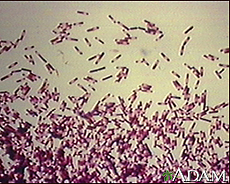 |
 |
 |
Other Health Topics:

-
Related Topics
-
Go Local
- Services and providers for Clostridium Difficile Infections in the U.S.
-
Clostridium Difficile Infections
Also called: C. diff. infections, Clostridium enterocolitis, pseudomembranous colitis
Clostridium difficile (C. difficile) is a bacterium that causes diarrhea and more serious intestinal conditions such as colitis. Symptoms include
- Watery diarrhea (at least three bowel movements per day for two or more days)
- Fever
- Loss of appetite
- Nausea
- Abdominal pain or tenderness
People in good health usually don’t get C. difficile disease. You might get the disease if you have an illness that requires prolonged use of antibiotics. Increasingly, the disease can also be spread in the hospital. The elderly are also at risk. Treatment is with antibiotics.
Centers for Disease Control and Prevention
Start Here
- General Information about Clostridium difficile Infections(Centers for Disease Control and Prevention)
| Basics | Learn More | Multimedia & Cool Tools |
|---|---|---|
|
||
| Research | Reference Shelf | For You |
|
-
Overviews
- C. difficile (Clostridium difficile)(Mayo Foundation for Medical Education and Research)
- Clostridium difficile-Induced Colitis(Merck & Co., Inc.)
-
Diagnosis/Symptoms
- Clostridium difficile Toxin(American Association for Clinical Chemistry)
-
Alternative Therapy
-
Introduction to Probiotics
 (National Center for Complementary and Alternative Medicine)
(National Center for Complementary and Alternative Medicine)
-
Introduction to Probiotics
-
Specific Conditions
- Antibiotic-Associated Diarrhea(Mayo Foundation for Medical Education and Research)
- Information about a New Strain of Clostridium difficile(Centers for Disease Control and Prevention)
- Pseudomembranous colitis(Mayo Foundation for Medical Education and Research)
-
Clinical Trials
- ClinicalTrials.gov: Clostridium difficile(National Institutes of Health)
- ClinicalTrials.gov: Enterocolitis, Pseudomembranous(National Institutes of Health)
-
Journal Articles
References and abstracts from MEDLINE/PubMed (National Library of Medicine)
- Article: Proceedings from the 2nd International Clostridium difficile Symposium, Maribor, Slovenia,...
- Article: Collateral damage. The rise of resistant C. difficile.
- Article: Changing pattern of Clostridium difficile associated diarrhoea in a tertiary...
- Clostridium Difficile Infections -- see more articles
- Medical Encyclopedia Return to top
-
Organizations
-
Centers for Disease Control and Prevention
Also available in Spanish
-
National Institute of Allergy and Infectious Diseases

-
Centers for Disease Control and Prevention
-
Statistics
- Potentially Deadly Infection Doubles among Hospital Patients Over Last 5 Years(Agency for Healthcare Research and Quality)
| Home | Health Topics | Drugs & Supplements | Encyclopedia | Dictionary | News | Directories | Other Resources | |
| Copyright | Privacy | Accessibility | Quality Guidelines U.S. National Library of Medicine, 8600 Rockville Pike, Bethesda, MD 20894 National Institutes of Health | Department of Health & Human Services |
Date last updated: 23 July 2008 Topic last reviewed: 06 May 2008 |






